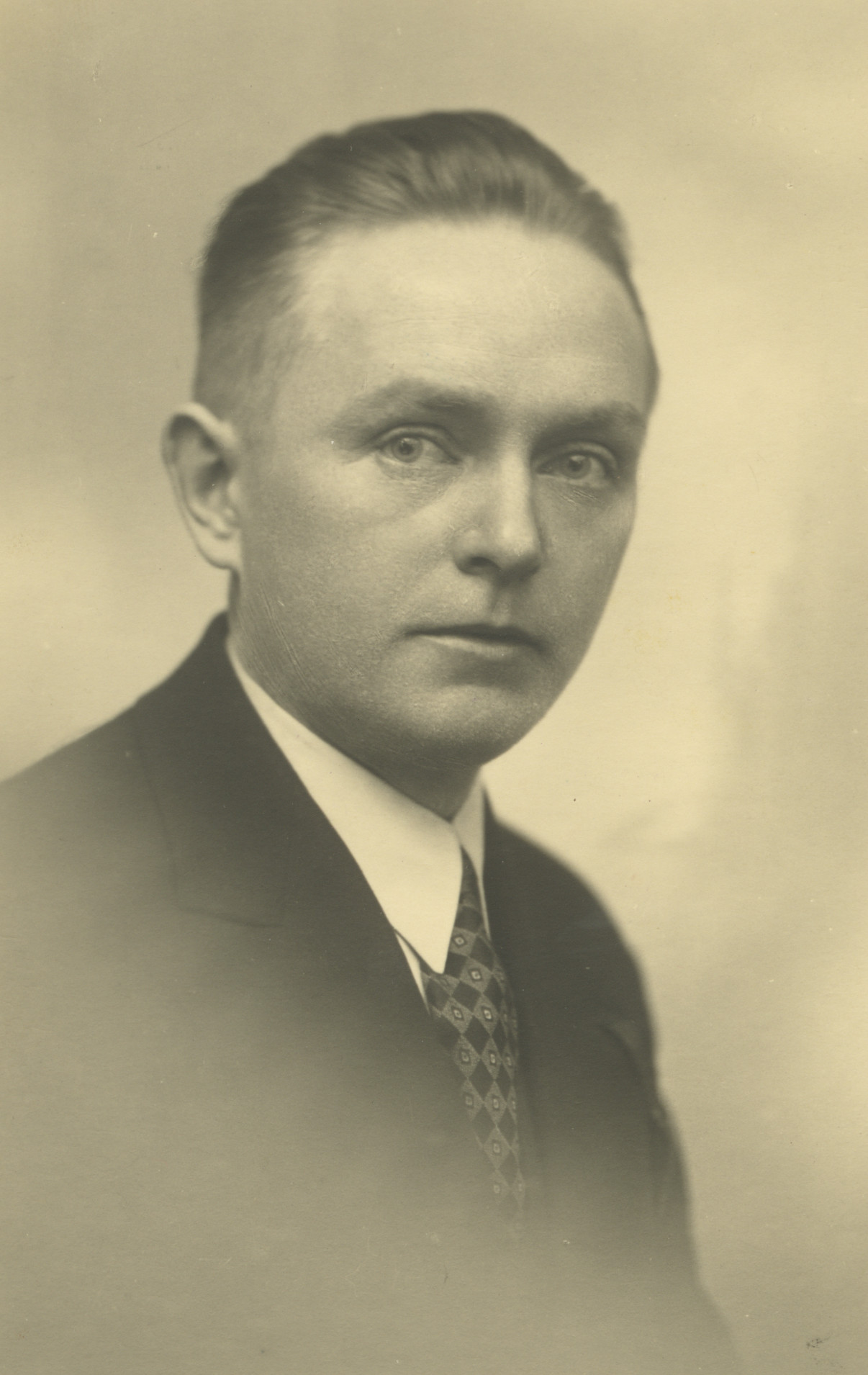
Erni Hiir
Erni Hiir (given name Ernst Hiir; 29./16. III 1900 – 27. X 1989) was a poet and translator. His poetic style was at first futuristic; in the nineteen-thirties he represented the “true-to-life” trend in poetry; from 1944 he favoured the Soviet ideology.
Hiir was born at the village of Karjanurme in Viljandimaa county (later part of Valgamaa) as the son of a tenant farmer; in 1911 the family moved to Tartu. Hiir attended Taagepera parish school at Ala, from 1911 to 1918 the Tartu School of Science, from 1920 to 1921 the theatre class at A. Nieländer’s music school in Tartu, and in 1921-1922 as an auditor in the faculty of philosophy of the University of Tartu. He was a member of the Estonian Writers’ Union from 1927. Hiir was an author who was loyal to the occupying power in Estonia. From 1940 he worked in the editorial office of the newspaper Postimees, and from 1944 to 1945 he was managing editor of the Uus Postimees. He was a member of the CPSU from 1944 until his death. From 1945 to 1960 he was executive secretary of the Tartu branch of the Writers’ Union. In 1962 he moved to Tallinn. He is buried in the Metsakalmistu Cemetery.
Erni Hiir made his poetic debut in 1918 in the newspaper Postimees. A year later, with Albert Kivikas, he published a futuristic verse brochure, Ohverdet konn (‘Sacrificial Frog’), and Täielik teoste kogu I-II (‘Complete Collection of Works’), consisting only of the covers. Hiir’s first collections in 1924, Arlekinaad (‘Harlequinade’) and Huhu. Merituulen (‘Huhu. In the Sea Wind’) are works along futuristic lines, frequently involving sound-play. With Juhan Sütiste and Mihkel Jürna, Hiir issued the literary collections Sang and Bumerang, which expressed the authors’ dissatisfaction with the current state of literature. The works attracted attention and invited debate in the literary landscape. Hiir became known in literature as a champion of young poets, and one of the leaders of the group opposed to the Siuru movement (Adson, Visnapuu, Tuglas, Gailit and others), out of which, at the end of the twenties, grew the so-called “true-to-life” movement and the Kirjanduslik Orbiit (‘Literary Orbit’) grouping, which announced itself with a journal of the same name at the end of 1929.
Hiir’s collection Meeri-Maria-Mari (1926) consists entirely of sonnets, but they are modern in theme depicting city life, congenial company and women. In the collection Lemmiklaulud (‘Favourite Songs’, 1926), Hiir turned to a traditional verse-form to portray home and the homeland. This trend continued in the thirties, when Hiir became a proponent in poetry of the official positive outlook and “working Estonian” idea propagated by the authoritarian regime. The coming of Soviet power again brought with it a change in Hiir’s work; his poems started to exalt the new order and the communist view of life. The collections Võidule (‘To Victory’, 1944), Uutele võitudele (‘To New Victories’, 1950), Heledamaks muutub päev (‘The Day Gets Brighter’, 1967), and Lühilood ajakajana (‘Short Stories as an Echo of Time’, 1972) are sloganeering and declarative in style. Several compilations of Erni Hiir’s works have appeared.
Hiir translated Krylov’s fables and mainly Russian Soviet verses; he compiled four selections of modern Russian poetry (published 1963-1966) and published articles and theatre criticism.
A. N. (Translated by C. M.)
Books in Estonian
Poems
Erni Hiir, Albert Kivikas, Ohverdet konn. Tartu: Odamees, 1919, 8 lk.
Tantse maailmastik. Täielik teoste kogu. Raa… 4, Nr. 1. Tartu: 1919, 3 lk.
Tantse maailmastik. Täielik teoste kogu. Raa… 4, Nr. 2. Tartu: 1919, 3 lk.
Arlekinaad. Tartu: 1924, 7 lk.
Huhu. Merituulen. Tartu: 1924, 16 lk.
Hiir, Schütz, Jürna, Sang. Tartu: Arlekiin, 1925, 36 lk. [Autorid: Erni Hiir, Juhan Sütiste, Mihkel Jürna.]
Hiir, Schütz, Jürna, Bumerang. Tartu: Hiir, Schütz, Jürna, 1925, 62 lk. [Autorid: Erni Hiir, Juhan Sütiste, Mihkel Jürna.]
Lemmiklaulud. Tartu: Noor-Eesti, 1926, 71 lk.
Meeri Maria Mari. Armastuslaulud. Tartu: 1926, 79 lk.
Puhtewird. Tartu: 1927, 66 lk. [Ilmus 10 eksemplaris.]
Kodutee. Tartu: Eesti Kirjanikkude Liit, 1931, 63 lk.
Pöörang. Viies kogu luuletisi. Tartu: Loodus, 1933, 79 lk.
Sinimäed. Kuues kogu luuletisi. Tartu: Loodus, 1935, 126 lk.
Raudvärsid. Seitsmes kogu luuletisi. Tartu: Eesti Kirjanikkude Liit, 1937, 94 lk.
Päikeselised päevad. Värsivalimik. Tartu: Loodus, 1937, 189 lk.
Palgest palgesse. Kaheksas kogu luuletusi. Tartu: Noor-Eesti, 1938, 94 lk.
Homsele vastu. Üheksas kogu luuletusi. Tartu: Noor-Eesti, 1939, 83 lk.
Võidule. Luuletusi Isamaasõjast. Leningrad: Ilukirjandus ja Kunst, 1944, 71 lk.
Elu nimel. Värsivalimik 1918-1945. Tallinn: Ilukirjandus ja Kunst, 1946, 248 lk.
Uutele võitudele. Luuletusi 1944-1950. Tallinn: Eesti Riiklik Kirjastus, 1950, 92 lk.
Külva ning loo!. Kogutud luuletused autori redaktsioonis. Tallinn: Eesti Riiklik Kirjastus, 1958, 387 lk.
Heledamaks muutub päev. 12. kogu värsse. Tallinn: Eesti Raamat, 1967, 100 lk.
Kui tulevad käod. Valimik loodusluulet. Ilmub luuletaja 70. sünnipäeva puhul. Tallinn: Perioodika, 1970, 46 lk.
Võidule!. Koostanud Endel Sõgel. Tallinn: Eesti Raamat, 1970, 64 lk. [Sari ‘Poeedilt sõjaveteranile’.]
Lühilood ajakajana. Kolmeteistkümnes kogu värsse. Satiiripalu. Tallinn: Eesti Raamat, 1972, 86 lk.
Mässulaulud. Valik võitlusluulet 1918-1930. Tallinn: Eesti Raamat, 1975, 146 lk.
Luuletused. Avatlused. Heitluste kumad. Tallinn: Eesti Raamat, 1976, 299 lk.
Luuletused. Tööpoeesia. Tallinn: Eesti Raamat, 1979, 238 lk.



